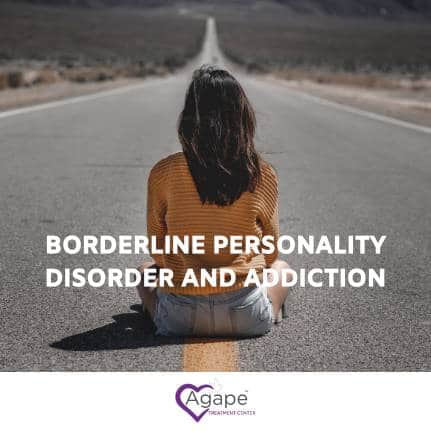
The relationship between substance abuse and BPD is complex and unstable, as the pain and impulsive behaviors associated with BPD tend to exacerbate one’s substance abuse. At the same time, the side effects of drug and alcohol abuse are known to worsen the symptoms of BPD.
In an attempt to cope with the symptoms of BPD, some people abuse drugs or alcohol. While these short-term fixes might seem to work, long term substance abuse is likely to lead to addiction and an array of other problems. In order to overcome the unique challenges associated with borderline personality disorder and addiction, individuals are encouraged to seek help from a dual diagnosis treatment program.
Table of Contents
ToggleSigns and Symptoms of Borderline Personality Disorder
Borderline personality disorder is a mental health condition characterized by impulsivity, intense emotions, distorted sense of self and self-image, and volatile relationships. This mental illness affects the way people feel about themselves, how they relate to others, and how they react to situations.
According to the Mayo Clinic, signs and symptoms of BPD include:[1]
- Fear of abandonment causing people to go to extreme measures to avoid being separated from or rejected by their loved ones
- Having re-curring patterns of unstable relationships where they might idolize a person for a period of time then suddenly believe that the person doesn’t care about him or her
- Experiencing rapid changes in self-identity and self-image that causes goals, values, morals, and interests to change quickly
- Having periods of stress-related paranoia or feeling as though one is losing contact with reality
- Impulsive behaviors like substance abuse, binge eating, gambling, drunk driving, practicing unsafe sex, or self-sabotage
- Making suicidal threats in response to fearing separation, rejection, or abandonment
- Experiencing intense mood swings that last for as little as a few hours or as long as several days
- Feeling ongoing emptiness or depression
- Having or showing inappropriate and intense anger or losing one’s temper in response to small situations or fear of abandonment
Like other mental health conditions, experts don’t fully understand the causes of BPD. However, BPD may be linked to the following:
- Environmental factors such as childhood abuse or neglect
- Genetics may play a role, as some personality disorders are inherited
- Brain abnormalities related to emotion regulation and impulsivity
Sadly, borderline personality disorder is often linked to many other problems, such as addiction.
The Connection Between Borderline Personality Disorder and Addiction
People who suffer from BPD have extremely high rates of depression, anxiety, eating disorders, self-injurious behaviors, and suicide. As a result, personality disorders like BPD severely affect one’s quality of life. People with borderline personality are susceptible to the following side effects and consequences:
- Difficulty maintaining a job
- Having conflict-filled relationships
- Self-injury, hospitalizations, and suicide attempts
- Abusive relationships
- Unplanned pregnancies or STDs
- Legal issues or jail time
- Depression, anxiety, PTSD, and other mental illnesses or personality disorders
- Eating disorders
- Drug and alcohol abuse
- Addiction and/or alcoholism
Not only are people with borderline personality disorder more likely to suffer from addiction due to depression and impulsivity, but the two conditions have overlapping symptoms that lead to one another. For example, common symptoms of borderline personality disorder and addiction include:
- Impulsive, self-destructive behaviors
- Mood swings, including depression and mania
- May manipulate or deceive loved ones
- Have a lack of concern for their well-being
- Suffer from unstable finances and relationships
Many people with BPD abuse drugs or alcohol to mask their depressive symptoms and feel more comfortable around others. Borderline personality disorder and substance abuse are so common that one study found that nearly 78% of adults with BPD will have a substance use disorder at some point. Furthermore, people with BPD are more than three times more likely to suffer from alcohol use disorder than those without. The most common addiction problems among people with borderline personality disorder are alcohol, cocaine, and opioids.[2]
Dual Diagnosis Treatment for Addiction and Borderline Personality Disorder
People who suffer from borderline personality disorder and drug or alcohol addiction may have additional challenges in their recovery than others. For example, treatment retention rates tend to be lower among people with BPD than people with substance use disorder alone. Furthermore, people with BPD require more intensive mental health treatment to help address their additional issues. As a result, these conditions are best treated in dual diagnosis programs.
Dual diagnosis programs use various techniques to treat substance use disorder and BPD. These may include cognitive behavioral therapy, group therapy, individual therapy, dialectical behavior therapy, and more. These therapies aim to help patients let go of self-destructive behaviors, learn to regulate their emotions better, and motivate themselves to make positive life changes.
Although no medications are used to treat borderline personality disorder, many of the same therapies used in addiction treatment help modify the behaviors of people with BPD. Some of the most important aspects that treatment for borderline personality disorder and addiction covers include the following:
- Teaching patients how to manage their moods and work through triggers
- Promoting mindfulness and stress-reduction techniques
- Learning to work through cravings for drugs and alcohol
- Identifying self-affirming ideas to help promote a better connection with others
- Setting realistic goals for patients to achieve
With the help of intensive therapy and community support, people suffering from BPD and substance abuse can learn to take back control of their lives.
Get Help Today
At Agape Treatment Center, we understand the importance of treating addiction’s underlying causes and conditions. Most clients we see need assistance with mental health conditions, and we have the training and expertise to deliver those results. If you or someone you love is suffering from addiction and borderline personality disorder, pick up the phone and call us today. We’ll help you sort through your questions, determine which type of treatment is the best fit, and get you started on the right path. Don’t wait any longer – we’re here for you.
References:






